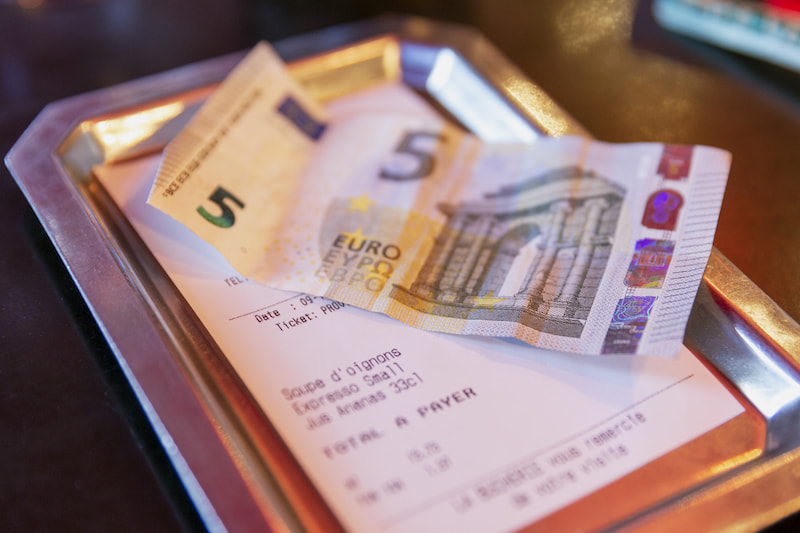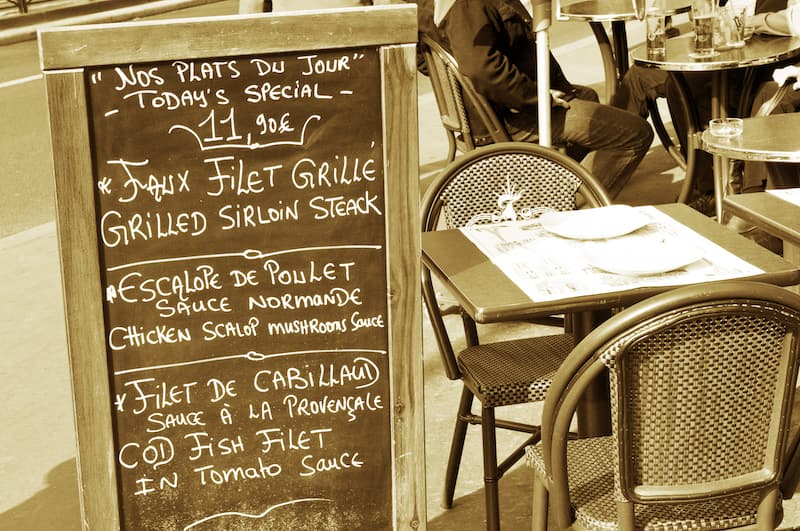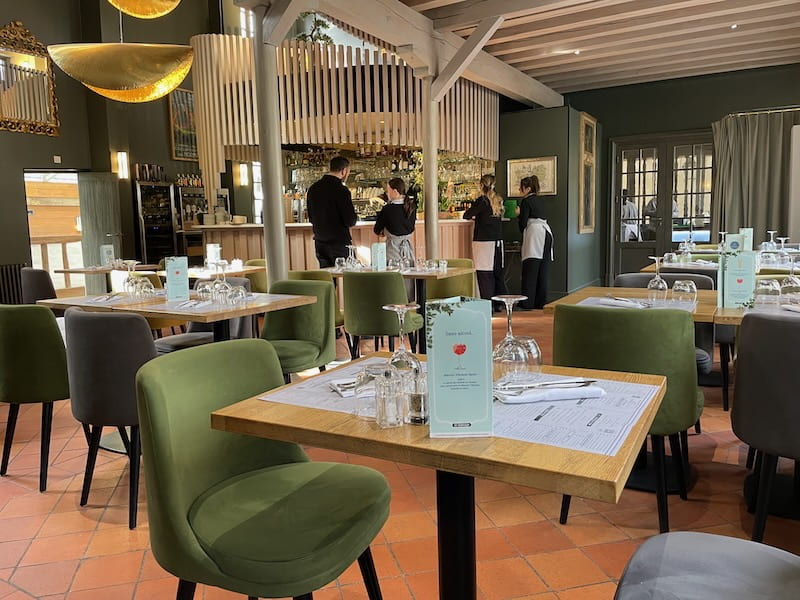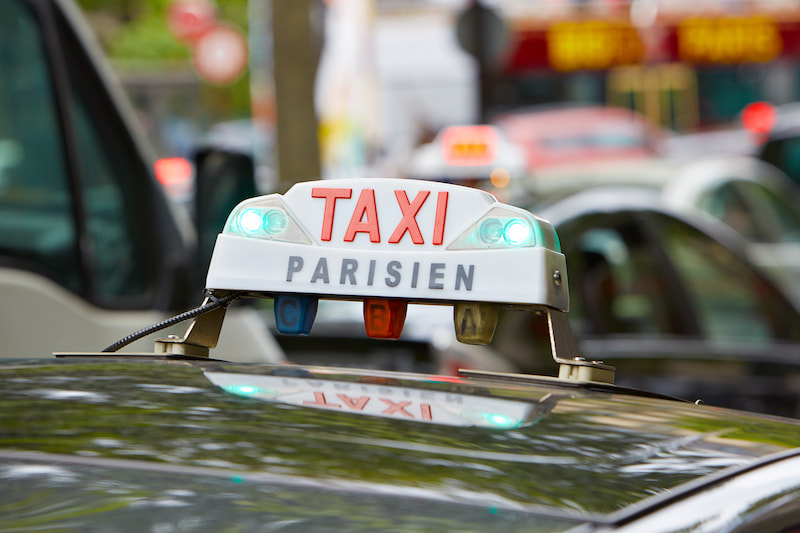Fascinated by Gallo-Roman history? Click Here to download > > > Here are 6 ways Rome affected France
- Home ›
- Plan Your France Trip ›
- Tipping in France
Is Tipping In France really a 'no-no'?
Updated 15 February 2026 by Leyla Alyanak — Parisian by birth, Lyonnaise by adoption, historian by passion
Tipping in France isn’t difficult – but it is undefined. There are no fixed percentages, no hard rules, and no social panic if you get it slightly wrong. Here’s a quick overview of how much to leave, and when.
You know that moment? The one that involves the silent battle you fight when deciding whether to tip, and how much? Well, tipping in France is no exception.
After a delicious meal at your favorite restaurant, you'll call for the bill.
What happens next can, in some cases, be anxiety-inducing, especially if you're from a country with relatively set tipping practices.
So, do you tip in France or not?
The short answer is... it depends.
In general, it is not required to tip (some exceptions do exist). Until recently, there was no expectation for you to do so, but that is slowly changing, especially in tourist areas.
Under French law, French service industry workers – such as waiters and bellhops – earn a monthly living wage, plus paid holidays and other benefits.
The French government says it clearly (on its French-language site): tipping is an option, not a requirement.
What is "tip" in French? Un POURBOIRE, pronounced poor-BWAHR.
That said, if you've been served particularly well, leaving a tip is a nice gesture of appreciation.
There is a new reality, however: the rising cost of living, with which service industries have not kept pace. Salaries have remained steady in the face of escalating prices, and it's becoming harder to find service staff as a result.
Rents are often sky-high, especially in tourist areas, and other costs are rising fast, making it difficult for staff to find places to live.
Another development is the rise of digital tipping: more French restaurants and cafés now offer an option to add a tip when you pay by card (for example, by selecting 5 %, 10 % or a fixed amount on the card terminal) — a shift from the old norm when tips were almost always cash only.
Keep in mind that digital tips may be pooled and shared among staff, depending on the establishment. They don't always go directly to the person serving you. If you want to make sure your tip goes specifically to your server, it's best to use cash.
READ MORE: Best travel tips to plan your trip to France
I dislike this approach and will always press 0%. If the service was good and I decide to leave a tip, I'll leave it in cash on the table. But that's a personal choice...

How to tip in France: tipping etiquette 101
Yes, tipping is an act that involves some level of tact, not to mention understanding the etiquette that surrounds it.
In France, leaving a tip swings both ways.
If you don't tip, that's fine – no one will think you're particularly rude. Pressuring you to leave a tip is rare and I've only seen it happen in establishments that cater almost exclusively to tourists.
The alternative: can it be seen as rude to leave a tip? Leaving a small extra — whether cash or via the payment terminal — is polite when service is particularly good, but oversized tips (like 15 – 20 % typical in North America) still feel unusual to many French servers.
READ MORE: Are These France's Most Popular Foods?

Tipping in France’s restaurants
While it may not be expected, it is usually common practice to leave a tip at a café, bistro, bar, or restaurant.
Somewhere on your menu you'll probably see the following note: "15% service compris", or service charge included.
This is not a tip. In other words, the 15% isn't split up among wait staff but is incorporated into restaurant earnings. The rationale is that wait staff received decent salaries and benefits, made possible in part by the extra 15% earned by the restaurant.
Any addition of a "pourboire" or tip is purely voluntary.
A SMALL CLARIFICATION
When a server says “service not included,” they usually mean that a pourboire is not included. Legally, the service charge is already built into menu prices. The extra tip is optional and discretionary — it is not a second mandatory service fee, but a proper tip.
If you're in a café, small change is fine: round it up to the nearest euro rather than trying to calculate what percentage to leave. In restaurants, rounding up or leaving a few euros is normal; it’s still far below the 15 – 20 % that many North Americans leave.
Did coffee cost you €1.80? Leave €0.20 for a total of €2. If drinking in a bar with a far higher tab, leave a little more. Your bill is €18-€19? Leave €20. The same in a restaurant. Your bill is €43? Leave €45.
 Getting ready to open for business
Getting ready to open for businessNow, if you're eating in a Michelin-star restaurant with all the wine and trimmings, you should leave a generous tip, but only for exceptional service. In that case, a larger tip will not seem out of place.
Leave €2-€3 on the table (a good rule of thumb is to leave €1 for each €20 spent – but again, this is very flexible).
By the time you reach €100, your tip can increase proportionately. I would leave €5 if my meal cost €100, possibly a bit more if the level of service was exceptional.
But here's the good news: if you leave what you think is too little, relax: it won't be. French waiters and waitresses will be pleased with even a small tip.
Leaving a big tip may even be seen as presumptuous, or an act of showing off. French people don't like to talk about money, and a huge tip is just that, making money an issue.
Now, where exactly do you leave that tip?
Some place it discreetly under a saucer or plate, but it’s fine to leave it in the open as well.
If your bill comes in a folder, possibly leather in some better establishments, open the folder, look at the bill, then deposit your cash or credit card in the folder with the top bit sticking out. This will signal to the waiter that you're ready to pay. When your credit card or change comes back, that's when you leave your tip, in cash, inside the folder.
A few more popular or family establishments will ask you to pay when you leave. Check to see if they have a tip jar at the cash register; this is a pool for all staff to share equally.
Tipping in hotels
When it comes to room service, you could give the attendant a Euro or two when your meal arrives, but it's not obligatory. When you leave the hotel, please do leave something for the housekeeping staff – I tend to leave a couple of Euros per day of stay on the pillow or the night table just before checkout.
If you’re visiting one of the many theaters in Paris or the rest of France, tipping the usher who shows you to your seat is expected. The same goes for tour guides, especially walking tours, and always when the walking tour is "free" – these are often run by students who live off the tips.
Tipping everyone else
Now, about those exceptions to the general rule...
Hair and nail salons and hotel services do expect tips, so make sure you have a few coins for the bellhop who handles your luggage, the manicurist who buffs your nails, or the assistant who washes your hair. I leave the assistant €1-€2, the stylist about €5, or even €10 if it's a major salon or a complicated visit.

You should also tip your taxi driver a few Euros, even more if you've been caught in traffic or it's a particularly busy time of day.
What about bad service? I would leave no tip at all.
Finally, keep an eye out for signs that state “pourboire interdit”. This means that tipping is forbidden. You won’t find these signs in many places, but if you do, stick to it and ignore the urge to leave a gratuity.
Tipping in Paris
The city is an international destination, so servers are more accustomed to foreigners who do not know the tipping culture or who tip lavishly.
You'll also find more digital tipping prompts in Paris and in heavily visited areas than in smaller towns. Outside major tourist centers, many places still assume cash tips, and many don't use the card machine prompts at all.
In Paris, some servers might even tell you it’s necessary to leave a tip, and there are reports of rude waiters being insistent and making tourists uncomfortable – thankfully this is more the exception than the rule.
The law is quite clear: it is NOT compulsory to leave a tip, nor is it even expected. Trying to force your hand is basically a scammy way of trying to get money out of you. Flee the establishment, give it a poor revivew, and do not return: it's a tourist trap and there's every chance the quality of food will be as poor as the service.
Remember: only tip if you feel you want to.
Recap of tipping in France
Restaurants and cafés
- Round up in cafés
- €2-€5 in casual restaurants
- Around 5% for very good service
- 5-10% only in higher-end establishments
Hotels
- Luggage assistance: €1-€2 per bag
- Housekeeping: €1-€2 per day
- Concierge (special help): €5-€20 depending on service
Guides and tours
- “Free” walking tour: €10-€20
- Paid tour: €5-€10, not obligatory
Transport
- Taxi: round up or add €1-€5
- More if luggage or unusual assistance
Personal services
- Hairdresser: €5-€10 to stylist
- Shampoo assistant: €1-€3
- Beautician: €3-€5

Common misconceptions about tipping in France
- “You must tip 15–20%.” No. That is a North American norm, not a French one.
- “Service compris means you should not tip at all.” Not necessarily. It means service is included, but small additional tips are still common for good service.
- “Everyone tips the same way.” Definitely not. On the contrary, habits vary widely by region, generation, and type of establishment.
Final verdict on tipping in France
The good thing about tipping in France is that the rules are relatively flexible: tipping isn't compulsory, nor is it even expected, but a small amount is always appreciated.
Always carry some cash to use for gratuity, but beware, as pickpockets in Paris (and other highly visited cities) know that most visitors tend to do this.
Also, be ready for electronic prompts when you pay with a card, especially in tourist hubs but spreading rapidly.
And remember, a few words of French will take you and your tipping skills far. C’est pour vous (this is for you) is your safest bet for ensuring your tip is noticed and appreciated. Pronunciation? say-poor-VOO!
Before you go...
The ins and outs of French know-how and etiquette are often obscure, and even being French, I'm not always 100% sure I'm not transgressing some unwritten rule.
To learn a bit more about these and the French psyche, here's how to find out whether all the stereotypes about the French are true, along with some interesting facts about the French!
COMING TO FRANCE? THESE RESOURCES CAN HELP!
🏨 Accommodation - I rent hotels quickly and easily through booking.com
🚘 Car rentals - I use Discovercars, Europe's best car rental website
🚊 Train tickets - I book my train and bus tickets on Omio or Trainline
🚌 Day tours - I take the best day tours with Viator and GetYourGuide
Did you enjoy this article? I'd love if you shared it!

